

Ubernomics. Who are the Uber Drivers? What kind of workers are driving for Uber?
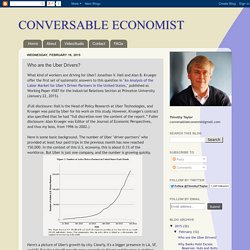
Jonathan V. Hall and Alan B. Krueger offer the first set of systematic answers to this question in "An Analysis of the Labor Market for Uber’s Driver-Partners in the United States," published as Working Paper #587 for the Industrial Relations Section at Princeton University (January 22, 2015). (Full disclosure: Hall is the Head of Policy Research at Uber Technologies, and Krueger was paid by Uber for his work on this study. However, Krueger's contract also specified that he had “full discretion over the content of the report.” Here is some basic background. Now we know how many drivers Uber has — and have a better idea of what they’re making A woman leaves the headquarters of Uber in San Francisco.
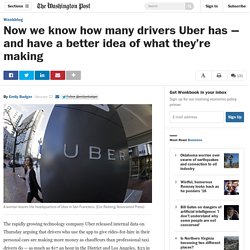
(Eric Risberg/Associated Press) The rapidly growing technology company Uber released internal data on Thursday arguing that drivers who use the app to give rides-for-hire in their personal cars are making more money as chauffeurs than professional taxi drivers do — as much as $17 an hour in the District and Los Angeles, $23 in San Francisco and $30 in New York. Those numbers, released as part of the most extensive peek yet into its business model, have only inflamed debate about what companies like Uber mean for the economy and whether the kind of work they offer is sustainable for the tens of thousands of people who have signed up. Uber’s Business Model Could Change Your Work. Photo As Uber has grown to become one of the world’s most valuable start-ups, its ambitions often seem limitless.

But of all the ways that Uber could change the world, the most far-reaching may be found closest at hand: your office. Uber, and more broadly the app-driven labor market it represents, is at the center of what could be a sea change in work, and in how people think about their jobs. “L’Uberisme est un thatcherisme” Antonio Casilli est maître de conférences en sociologie à Télécom Paris-Tech.

Auteur des Liaisons Numériques, il dénonce la récupération marchande de la culture du partage par les entreprises comme Uber ou Airbnb, qui remettent en question le droit du travail. Propos recueillis par Ania Nussbaum et Florian Reynaud Les entreprises comme Uber se réclament de l’ « économie du partage ». Ne sont-elles pas l’aboutissement des logiques capitalistes ? L’Uberisme est un thatchérisme. Comme Thatcher, Uber prétend s’attaquer au corporatisme, celui des taxis. Les travailleurs eux-même ne sont-ils pas en demande de ces petits jobs trouvés via des applications sur internet ? Tout le monde est tellement paupérisé que, finalement, bosser pour Uber et avoir un petit complément de revenus devient intéressant.
Certains disent apprécier la flexibilité offerte par ces applications. La flexibilité est le mensonge ultime. Pourquoi les intellectuels ne critiquent cette précarisation du travail ? Ces « barbares » du numérique qui changent la France. Budget fiscalité Croissance, déficit : Bruxelles conforte le scénario de la France EXCLUSIF - La Commission européenne dévoile ses nouvelles prévisions économiques jeudi matin.

Elle table sur une croissance de 1 % cette année, avec un... The sharing economy is a lie: Uber, Ayn Rand and the truth about tech and libertarians. Horror stories about the increasingly unpopular taxi service Uber have been commonplace in recent months, but there is still much to be learned from its handling of the recent hostage drama in downtown Sydney, Australia.
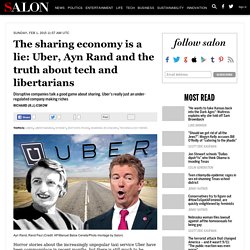
We’re told that we reveal our true character in moments of crisis, and apparently that’s as true for companies as it is for individuals. A number of experts have challenged the idea that the horrific explosion of violence in a Sydney café was “terrorism,” since the attacker was mentally unbalanced and acted alone. But, terror or not, the ordeal was certainly terrifying.
Amid the chaos and uncertainty, the city believed itself to be under a coordinated and deadly attack. The Gig Economy Won't Last Because It's Being Sued To Death. When Vilma and Greta Zenelaj came across a Craigslist job ad that promised they could make as much as $22 an hour and get paid fast, it seemed like a good deal.
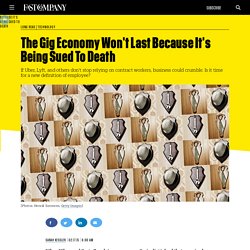
The Albanian sisters had moved to Santa Monica to get a foothold in the film industry, and though they had produced a few independent features, they had run out of savings before they could also make a living. It's Already Over And Uber Has Won - BuzzFeed News. Meet the Lawyer Fighting Uber’s Business Model. One of the perks of being a top Uber driver is the company’s employee-of-the-week award.
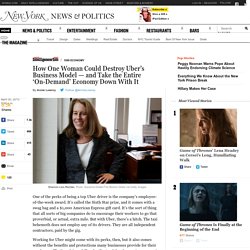
It’s called the Sixth Star prize, and it comes with a swag bag and a $1,000 American Express gift card. It’s the sort of thing that all sorts of big companies do to encourage their workers to go that proverbial, or actual, extra mile. But with Uber, there’s a hitch. The taxi behemoth does not employ any of its drivers. They are all independent contractors, paid by the gig. Working for Uber might come with its perks, then, but it also comes without the benefits and protections many businesses provide for their employees. The Gig Economy. Warning: This post touches politics.
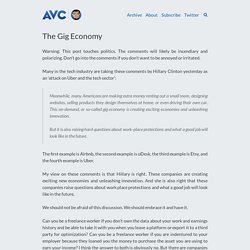
The comments will likely be incendiary and polarizing. Don’t go into the comments if you don’t want to be annoyed or irritated. Many in the tech industry are taking these comments by Hillary Clinton yesterday as an ‘attack on Uber and the tech sector': Meanwhile, many Americans are making extra money renting out a small room, designing websites, selling products they design themselves at home, or even driving their own car. This on-demand, or so-called gig economy is creating exciting economies and unleashing innovation.But it is also raising hard questions about work-place protections and what a good job will look like in the future.
The first example is Airbnb, the second example is oDesk, the third example is Etsy, and the fourth example is Uber. My view on these comments is that Hillary is right. Healthtap. What Airbnb Gets About Culture that Uber Doesn’t - HBR. Last week, as Uber battled a media firestorm after a senior executive talked of investigating unfriendly journalists and a company manager actually used its “God View” feature to track the comings and goings of a reporter, Airbnb welcomed more than 1,500 of its most productive providers to its first-ever host convention, an immersive celebration one expert attendee likened to a Mary Kay event.

The happy #AirbnbOpen sentiment of gift-wrapped programs, food drives, and a new company logo that doubles as a swing filled my Twitter stream, painting a stark contrast to the cynicism of the dystopian #ubergate tweets. The contrast was especially striking given that Airbnb and Uber are together inventing a new organizational form: platforms that are firm-market hybrids, supplying branded service offerings without actually employing the providers or owning the assets used in provision. These two flagship platforms of the sharing economy are remarkably similar in many ways. Uber’s New BHAG: UberPool. Uber’s New BHAG: UberPool “Can you take me Higher? To a place where blind men see Can you take me Higher? To a place with golden streets” — Creed, Higher.